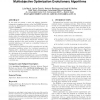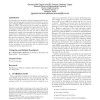GECCO
2007
Springer
13 years 11 months ago
2007
Springer
The focus of this paper is on how to design evolutionary algorithms (EAs) for solving stochastic dynamic optimization problems online, i.e. as time goes by. For a proper design, t...
GECCO
2007
Springer
13 years 11 months ago
2007
Springer
In previous work [8] a computational framework was demonstrated that allows a mobile robot to autonomously evolve models its own body for the purposes of adaptive behavior generat...
GECCO
2007
Springer
13 years 11 months ago
2007
Springer
GECCO
2007
Springer
13 years 11 months ago
2007
Springer
This paper investigates extensions of No Free Lunch (NFL) theorems to countably infinite and uncountable infinite domains. The original NFL due to Wolpert and Macready states th...
GECCO
2007
Springer
13 years 11 months ago
2007
Springer
GECCO
2007
Springer
13 years 11 months ago
2007
Springer
The proliferation of all kinds of devices with different security requirements and constraints, and the arms-race nature of the security problem are increasingly demanding the de...
GECCO
2007
Springer
13 years 11 months ago
2007
Springer
In multiobjective particle swarm optimization (MOPSO) methods, selecting the local best and the global best for each particle of the population has a great impact on the convergen...
GECCO
2007
Springer
13 years 11 months ago
2007
Springer
In this work we present a novel and efficient algorithm– independent stopping criterion, called the MGBM criterion, suitable for Multiobjective Optimization Evolutionary Algorit...
GECCO
2007
Springer
13 years 11 months ago
2007
Springer
Evolution of analogue circuitry on a cell based system can benefit from the use of a generic cell design. A comparative analysis of the re-routing ability of two different cell ...
GECCO
2007
Springer
13 years 11 months ago
2007
Springer
In this paper, we introduce a formal-language model for explicitly formalizing agent-environment interaction in a multiagent systems (MAS) framework: Conversational Grammar System...




